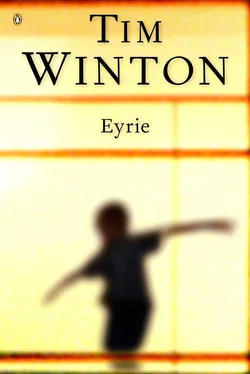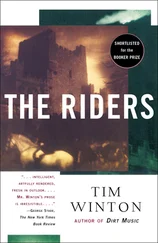The Mirador. Not much of the winsome Spanish turret about it, that’s for sure. It was a classic shitbox: beige bricks, raw concrete galleries, ironbar railings, doors and windows like prison slots. Hard to credit that fifty years ago some nabob thought it a grand idea, a harbinger of progress. The place had grown old and grim within months of its completion and the subsequent years had not been gentle. Locals despised it. But it had been a haven for old folks, retired lumpers and clerks, invalid pensioners, transients, drunks and welfare mothers. They were still there, many of them, lately joined by the first gentrifying hopefuls and middle-class casualties like himself. Keely looked up at its meagre balconies. The drying mop, the ruined telly, the Dockers flag, the jaunty sunflower in a pot, the wheelchair flashing in the sun.
He swayed against the meter and felt a little flutter of affection for the old hulk. Like him, the building was a product of the sixties. And like him it was too large a mistake to be undone.
I’m not much, he told himself on the caustic forecourt, but I’m home.
The lobby stank of laundry soap, fresh paint, and mopped floors. As he entered, Keely fell in behind a woman and child heading for the lifts. He would have preferred to peel off into the laundromat a moment until they were gone, and then go on up alone when the coast was clear, but he was desperate to lie down; he felt faint and the headache was evil in him. Besides, the lift door rolled open as he approached; he’d only look like a wally backing away now. So he followed them in, careful to arrange himself and his morally unflattering plastic bag in the farthest corner of the carriage. When the woman punched the key for the tenth floor his heart sank.
You? she asked without looking his way.
Oh, he murmured. Same.
Neighbours, then, she said with a hint of scepticism.
He grunted. She sighed as if she’d already discounted his presence.
Keely snatched a look at the boy as he laid his head against the woman’s hip. The kid avoided his gaze. As they were hauled up slowly Keely fixed on the woozy stippled pattern of the car’s stainless-steel lining.
No good? the woman asked the boy.
I’m not right in myself, said the kid.
Did you sick up? The teacher didn’t say.
No, said the boy. But I’m not well.
You’re hot.
Yes, hot in the temperature.
The woman made a gentle laughing sound through her nose and repeated it without mockery: Hot in the temperature .
Keely sensed the pale flare of the woman’s face turning his way.
When he was really little, she said, he thought his forrid was his temperature. You know, let me check your temperature and everythin. Little smartarse.
Am not.
Are so.
Keely assembled a makeshift grin but spared himself the eye contact. There he was in monstrous outline, distorted by the shiny pressed steel, radiating fluorescent light from a hundred welts and dints. When he moved, his head swam. God, he thought, all the stoners in the building — do they take the stairs?
He dug a thumb into his temple, closed his eyes.
And now, she said. Now, he’s not right in himself .
Well, said the boy. I’m not.
You never get crook of a weekend, do ya?
I was once.
That was Easter, you dill. All that chocolate. Eyes bigger’n yer belly.
He felt the woman’s attention, the full force of her gaze. It was all he could do not to cringe. Inside his shirt the sweat began to run; he could feel panic rising in him like nausea and only the bounce of their arrival delivered him. As the door opened he lunged forward, hoisting his clammy supermarket bag after him, and took in a hot draught of air. Out on the walkway he stepped aside so they could pass, and the woman brushed by smelling of cigarettes and body spray. But the boy lingered. And when Keely looked back he saw him planted in the gap, fending the closing door off with hip and shoulder like a little half-back. His gaze was intense but removed and without the boy actually looking his way Keely sensed himself being registered, sized up. And it was awkward. Standing there, suspended. The woman waiting beside him with no pretence at patience. As if she blamed him as much as the kid for this delay.
Keely prepared to walk away but there was something about the boy that intrigued him. Perhaps the dark rings beneath his eyes. Or the pale blue irises. Such a round face. And they did something odd, those shadows, made the kid seem older than he was, older than he could be. His hair fell white and straight to his shoulders. He licked his lower lip, which was chapped, and bunted the door away again as the woman jangled her keys. The boy wore a little polo shirt, shorts, sneakers. Just an ordinary Mirador kid trying it on with his longsuffering mother. So what was it that made Keely’s stomach flip, standing here watching him gaze across the rooftops while the hot wind rose from the shaft at their feet? He had no experience with kids; he didn’t know what this was. But it felt a bit like being cased by a dog too wary to come right up and sniff.
When you’re ready, said the woman.
I’m ready, said the kid, stepping out, letting the door roll to.
Hope you feel better, Keely said to the boy.
You too, said the kid.
The woman snorted and fished for something in her bag. She’d been pretty once. In her denim skirt and sleeveless top she seemed puffy, almost bruised. Her dirty-blonde hair was dry and she had the kippered complexion of the lifelong smoker, but any man would still look twice.
You look familiar, she said.
She seemed to be about his age. One of her front teeth was chipped and discoloured, as though it were dying.
Well, he said. Same floor, I guess. Like you said, neighbours.
Where are you again?
It occurred to him she was only being careful, that she suspected him of having followed them up from the street through the security door.
Ten-oh-seven, he said.
Huh, she murmured, taking the serious little boy’s hand. Don’t think I seen you here before. Know you from somewhere, but.
Keely tried to bring it to a close by setting off along the walkway. Well, he said over his shoulder — a little more abruptly than he intended — I keep to myself.
He heard her grunt; it could have meant anything. When he pulled up at his door he saw her strolling along hand in hand with the boy, no longer in quite such a hurry. She was making sure. Which said something about the way he looked, no doubt, so he made a performance of digging out his key like the hunter home from the hill and all. But he was running out of puff now, listing against the gritty bricks, and as he hauled back the security screen and shoved the key in the lock, he saw the kid surge ahead of the woman, dart towards the iron balustrade and mount the bottom rung with a suddenness that sent a spasm of apprehension through him. He fumbled the key, dropped it, but couldn’t stoop to pick it up with the kid perched there on tiptoe, right outside the door, two metres away. The child’s skinny arms were knitted over the iron rail, head suspended in a roasting updraught, hair ripped back like the tail of a comet. As if he were speeding, hurtling, falling already. Brutal silver rooftops, far below. Traffic noise. Playground cries. A ship’s horn signalling imminent departure. Keely didn’t dare take his eyes off him. Too stunned, at first. Terrified he’d startle him disastrously by moving, by lunging, calling out. And then, for two, three, four whole seconds he was convinced his steady gaze was vital, that he was the only force securing the kid to the building. Sneakered heels tipped up, laces snickering in the wind. Keely heard the woman, clocked the peripheral blur of her ambling. Could not believe she was so lax, so sanguine about the child being this close to the edge, ten storeys high with his feet off the mottled concrete. He just locked onto the slight frame with his last fading energy, growing angrier with every slow-moving moment, furious at both of them for being so careless and such a cruel interruption. Until the little boy’s throat began to work and he looked as if he were about to puke. And in the instant Keely tensed himself to spring, to haul him back to safety, when it seemed the kid would retch and lose his grip, the boy hawked and sent a shining gob of spit out into space. And then the woman was there, cuffing the back of his neck goodnaturedly.
Читать дальше












